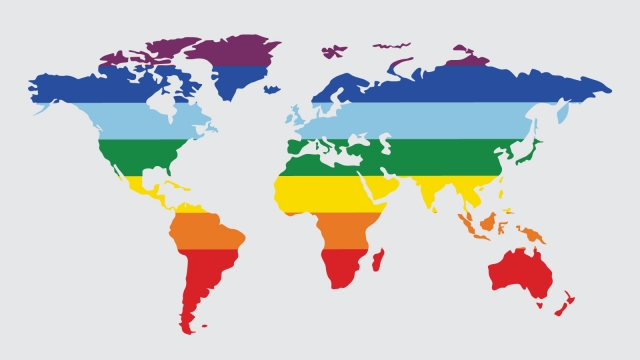Human Rights Campaign Commemorates International Day Against Homophobia, Transphobia and Biphobia

Today, HRC marked the observance of the 2018 International Day Against Homophobia, Transphobia and Biphobia (IDAHOTB) by spotlighting global challenges to LGBTQ equality and calling out the Trump-Pence Administration for turning a blind eye to the oppression and abuse of LGBTQ people around the globe.
Millions of LGBTQ people around the world are gaining visibility and fighting for their rights, but many live in fear and isolation – and under the rule of governments that criminalize their very identities. In most countries, LGBTQ people continue to lack fundamental rights and protections, and are at risk of discrimination and violence. Simply being LGBTQ is punishable by death in as many as 10 countries, and transgender people face an epidemic of violence and murder — including here in the U.S. From HRC’s Global Fellows Program to the organization’s #EyesonChechnya campaign, HRC is taking action to help end homophobia, transphobia and biphobia worldwide.
Today, HRC also launched a new Spanish language video calling attention to challenges in Latin America and elsewhere around the world. The video features HRC Global Innovator Alba Lucía Reyes, who lost her 16-year-old son to suicide in August 2014. Sergio faced unrelenting bullying by his peers and school officials in Colombia. Motivated by this tragedy, Reyes became an LGBTQ advocate and founded the Sergio Urrego Foundation — named after her son — to prevent suicide and promote protections for LGBTQ students. Watch the video here.
“While the global LGBTQ community is filled with innovative advocates advancing equality, the Trump-Pence administration has failed to stand up in support of LGBTQ people around the world — from Chechnya to Egypt and far too many other places,” said Ty Cobb, director of HRC’s global department. “This International Day Against Homophobia, Transphobia and Biphobia, it is imperative that world leaders commit to stepping up and doing more to protect the human rights of all people. Alba Lucía Reyes’ heartbreaking story should be a wake-up call for those who have been sitting on the sidelines as LGBTQ people suffer the very real consequences of homophobia, transphobia and biphobia.”
Last week, HRC and the Middle East Institute — the oldest Washington-based institution dedicated solely to the study of the region — co-hosted a panel on LGBTQ communities in the Middle East and the challenges and opportunities they face. Societies across the Middle East are still grappling with the convulsions of the Arab Spring protests, which sparked questioning of social norms across a wide variety of issues, including gender and sexuality. Since the 2011 uprisings, the LGBTQ community in the region has found itself at the heart of a widening social fissure between religious conservatives and secular democratic aspirants. While there has been progress in some areas, including a growing awareness and visible activism in Lebanon and Tunisia, there has also been a crackdown in places like Iraq and Egypt — where LGBTQ people face increasing danger and restrictions on their rights. Video of that panel discussion is available here.
Over the last year, HRC has also led an #EyesOnChechnya campaign to place a stronger spotlight on the continued persecution of gay and bisexual men in Chechnya. Just yesterday, the Russian government astonishingly repeated the Chechen dictator Ramzan Kadyrov’s bizarre claim that there are no gay people in Chechnya and denied that there had been any anti-LGBTQ human rights violations in Chechnya last year — despite widespread reports of abuses, eyewitness accounts and international condemnation. HRC has repeatedly called on administration officials to act and raise these attacks with Russian counterparts — to no avail. Earlier this spring, HRC President Chad Griffin wrote to Donald Trump urging him to speak up and condemn the atrocities as “crimes against humanity.” Both Trump and Pence have remained unconscionably silent.
HRC Global also works to advance equality around the world by bringing established and emerging LGBTQ leaders to Washington, D.C., as HRC Global Fellows for short and long-term professional development opportunities. These Global Fellows work alongside HRC staff and LGBTQ and human rights activists around the world to help leverage HRC’s domestic work in the international sphere, end discrimination against LGBTQ people, and realize a world that achieves fundamental fairness and equality for all. HRC also brings together advocates from around the world for the exchange of ideas and practices for advancing LGBTQ equality at HRC’s annual Global Innovative Advocacy Summit. Through the Global Fellows program and Global Innovative Advocacy Summit, HRC’s global alumni network includes advocates from more than 70 countries.
Some of the numbers and trends HRC is monitoring across the globe include:
- Marriage equality is now legal in 25 countries;
- 72 countries currently criminalize same-sex relationships, and in up to 10 countries, same-sex relationships may be punishable by death;
- More than 2,600 murders of transgender people were recorded between 2008 and 2017, according to data from the Trans Murder Monitoring project;
- A disturbing trend is emerging across the globe as governments in Lithuania, Nigeria and Russia are silencing equality advocates and organizations with so-called “anti-propaganda” laws.
IDAHOTB celebrates the anniversary of the World Health Organization’s (WHO) resolution to declassify same-sex attraction as a mental disorder in 1990. The move followed a similar decision by the American Psychiatric Association in 1973. The WHO’s monumental change created a shift in how many LGBTQ people were treated. In 2004, LGBTQ activists gathered for the first time to mark this date with rallies in support of equality. The anniversary is now marked by celebrations, governmental proclamations, and renewed efforts to end the discrimination and violence that LGBTQ people throughout the world still face.
You Might Like
